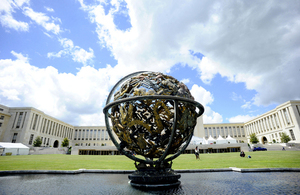Human Rights Council 34: UK Explanation of Voting on the resolution regarding Israel and the Occupied Palestinian Territories
This UK statement was delivered during discussion of the resolution during the 34th session of the Human Rights Council on 24 March 2017.

The Human Rights Council takes place at the Palais des Nations in Geneva
A just and lasting resolution that ends the occupation and delivers peace for both Israelis and Palestinians is long overdue. The UK shares the deep frustration of Human Rights Council members at the lack of progress in the Middle East Peace Process. The bleak picture painted in the discussions this week underlines the urgency of progress.
Respect for justice, the rule of law, and international law are the cornerstones of international peace and security.
Human rights are universal. For this reason the UK stands fully supportive of the Human Rights Council as an international institution. It is in all our interests to strengthen the rules-based international system - the level playing field for our security and prosperity - and to protect our values. However, the persistence of bias, particularly the disproportionate volume of resolutions against Israel, undermines the Council’s credibility as the globally focussed and objective international human rights body we all want and need. The Council must adjudicate human rights impartially, without bias or favour, and demonstrate this in both the issues it prioritises and the way in which they are dealt with.
Today we have voted according to our principles and our long-standing policy on the Occupied Palestinian Territories. A just and lasting solution that helps end the occupation is long overdue. We stand shoulder-to-shoulder with the international community in the conviction that a two-state solution is the only sustainable path for delivering justice and human rights for both Israelis and Palestinians. We strongly encourage direct negotiations to realise the shared vision of Israel, the homeland of the Jewish people, standing alongside a sovereign Palestinian state, the homeland of the Palestinian people.
We have serious concerns about the growth in illegal demolitions and settlement activity, as well as Israel’s extensive use of administrative detention. And it is for these reasons that we voted, as we have for many years, in favour of the resolutions on Self-Determination and Human Rights in the Occupied Palestinian Territories. Whilst, as in 2016, we felt obliged today to abstain on the Accountability and Settlements resolutions, in particular because of concerns about the need for both sides to take responsibility for human rights violations and the implications for businesses, these abstentions should not be misconstrued. The trend of Israeli conduct in the Occupied Palestinian territories over the past year has been negative.
But we must also recognise the continuing terrorism, incitement and violence that Israel faces. According to the Quartet’s report last year, there were 250 terrorist attacks, leading to the deaths of at least 30 Israelis. Renewed Hamas efforts to rebuild their tunnels are a grave concern. The scourge of anti-Semitic incitement and glorification of terrorism continue. And for as long as terrorists are treated as martyrs, peace will prove distant.
That is why we continue to call on all parties to act in accordance with international law. And that is why we supported UN Security Council Resolution 2334, which tackles both settlements and terror alike.
And yet neither “terrorism” nor “incitement” were a focus of this week’s Council discussions and resolutions. This is not acceptable.
Our enduring commitment to the universality of rights is also our source of enduring disappointment with the Council’s bias against Israel. Israel is a population of eight million in a world of seven billion. Yet since its foundation, the Human Rights Council has adopted 135 country-specific resolutions; 68 of which against Israel. Justice is blind and impartial. This selective focus on Israel is neither.
Israel is the only country permanently on the Human Rights Council’s agenda. Indeed when the Council voted to include Israel as a permanent item in 2007 – the so-called agenda Item 7 – it was Ban Ki Moon who expressed his deep disappointment “given the range and scope of allegations of human rights violations throughout the world.”
Nowhere is the disproportionate focus on Israel starker and more absurd than in the case of today’s resolution on the occupation of Syria’s Golan. Syria’s regime butchers and murders its people on a daily basis. But it is not Syria that is a permanent standing item on the Council’s agenda; it is Israel. Ten years have passed since Item 7 was instituted, and there has been no sign of change. Whilst we are unswerving in our conviction that the Golan Heights are occupied and do not recognise Israel’s annexation, we cannot accept the perverse message sent out by a Syria Golan resolution that singles out Israel, as Asad continues to slaughter the Syrian people. So we have voted against the Golan resolution.
Ultimately peace is built, brick by brick, through trust and goodwill on all sides. Human rights violations break down that trust. And so it is incumbent on Palestinians and Israelis alike to abide by International Human Rights Law. But by continuing an unacceptable pattern of bias through Item 7, the Council discredits its necessary voice, hardening positions on both sides. For as long as the Human Rights Council continues down this disproportionate and biased path, it will make the achievement of a negotiated two-state solution harder not easier.
So today we are putting the Human Rights Council on notice. If things do not change, in the future we will adopt a policy of voting against all resolutions concerning Israel’s conduct in the Occupied Syrian and Palestinian Territories.